Criminal Law: Decriminalizing Voluntary Euthanasia in New South Wales
VerifiedAdded on 2023/06/05
|17
|5018
|359
Essay
AI Summary
This essay presents a compelling argument for the decriminalization of voluntary euthanasia in New South Wales (NSW), focusing on the principles of autonomy and self-determination. It critiques the existing legal framework, particularly the Crimes Act, for its perceived unfairness and inconsistency in providing end-of-life choices. The essay emphasizes the importance of individual rights, arguing that competent individuals should have the right to make decisions about their own bodies and the timing of their death, provided it doesn't infringe on the rights of others. It contrasts autonomy-based arguments with utilitarian perspectives, cautioning against the potential for utilitarianism to justify non-voluntary euthanasia. Furthermore, the essay explores the analogy between the right to suicide and the right to assisted dying, advocating for compassionate assistance for those who are unable to end their lives independently or who seek assurance of a dignified and guaranteed death. The paper concludes by asserting the importance of respecting individual autonomy in end-of-life decisions and advocating for legal reforms that safeguard this right.
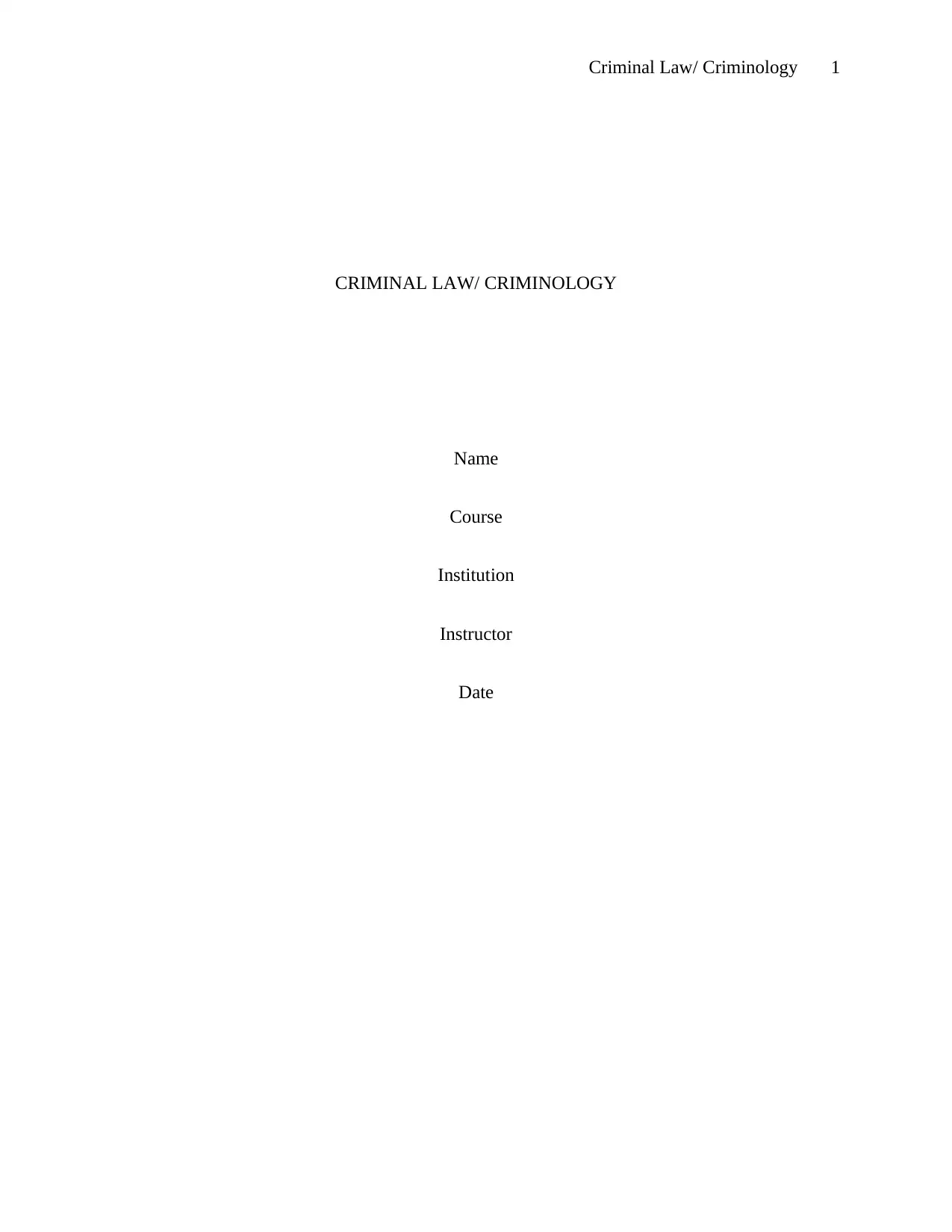
Criminal Law/ Criminology 1
CRIMINAL LAW/ CRIMINOLOGY
Name
Course
Institution
Instructor
Date
CRIMINAL LAW/ CRIMINOLOGY
Name
Course
Institution
Instructor
Date
Paraphrase This Document
Need a fresh take? Get an instant paraphrase of this document with our AI Paraphraser
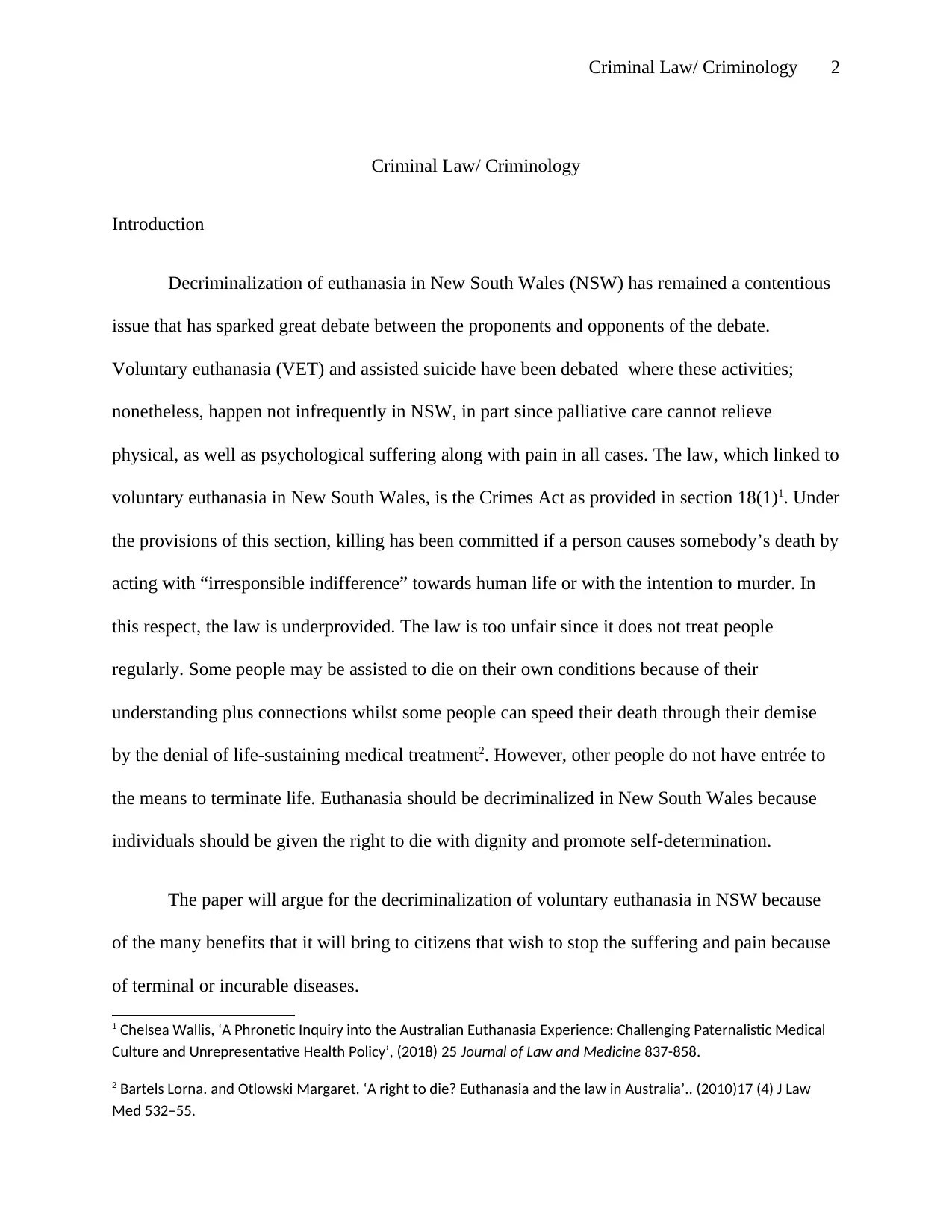
Criminal Law/ Criminology 2
Criminal Law/ Criminology
Introduction
Decriminalization of euthanasia in New South Wales (NSW) has remained a contentious
issue that has sparked great debate between the proponents and opponents of the debate.
Voluntary euthanasia (VET) and assisted suicide have been debated where these activities;
nonetheless, happen not infrequently in NSW, in part since palliative care cannot relieve
physical, as well as psychological suffering along with pain in all cases. The law, which linked to
voluntary euthanasia in New South Wales, is the Crimes Act as provided in section 18(1)1. Under
the provisions of this section, killing has been committed if a person causes somebody’s death by
acting with “irresponsible indifference” towards human life or with the intention to murder. In
this respect, the law is underprovided. The law is too unfair since it does not treat people
regularly. Some people may be assisted to die on their own conditions because of their
understanding plus connections whilst some people can speed their death through their demise
by the denial of life-sustaining medical treatment2. However, other people do not have entrée to
the means to terminate life. Euthanasia should be decriminalized in New South Wales because
individuals should be given the right to die with dignity and promote self-determination.
The paper will argue for the decriminalization of voluntary euthanasia in NSW because
of the many benefits that it will bring to citizens that wish to stop the suffering and pain because
of terminal or incurable diseases.
1 Chelsea Wallis, ‘A Phronetic Inquiry into the Australian Euthanasia Experience: Challenging Paternalistic Medical
Culture and Unrepresentative Health Policy’, (2018) 25 Journal of Law and Medicine 837-858.
2 Bartels Lorna. and Otlowski Margaret. ‘A right to die? Euthanasia and the law in Australia’.. (2010)17 (4) J Law
Med 532–55.
Criminal Law/ Criminology
Introduction
Decriminalization of euthanasia in New South Wales (NSW) has remained a contentious
issue that has sparked great debate between the proponents and opponents of the debate.
Voluntary euthanasia (VET) and assisted suicide have been debated where these activities;
nonetheless, happen not infrequently in NSW, in part since palliative care cannot relieve
physical, as well as psychological suffering along with pain in all cases. The law, which linked to
voluntary euthanasia in New South Wales, is the Crimes Act as provided in section 18(1)1. Under
the provisions of this section, killing has been committed if a person causes somebody’s death by
acting with “irresponsible indifference” towards human life or with the intention to murder. In
this respect, the law is underprovided. The law is too unfair since it does not treat people
regularly. Some people may be assisted to die on their own conditions because of their
understanding plus connections whilst some people can speed their death through their demise
by the denial of life-sustaining medical treatment2. However, other people do not have entrée to
the means to terminate life. Euthanasia should be decriminalized in New South Wales because
individuals should be given the right to die with dignity and promote self-determination.
The paper will argue for the decriminalization of voluntary euthanasia in NSW because
of the many benefits that it will bring to citizens that wish to stop the suffering and pain because
of terminal or incurable diseases.
1 Chelsea Wallis, ‘A Phronetic Inquiry into the Australian Euthanasia Experience: Challenging Paternalistic Medical
Culture and Unrepresentative Health Policy’, (2018) 25 Journal of Law and Medicine 837-858.
2 Bartels Lorna. and Otlowski Margaret. ‘A right to die? Euthanasia and the law in Australia’.. (2010)17 (4) J Law
Med 532–55.
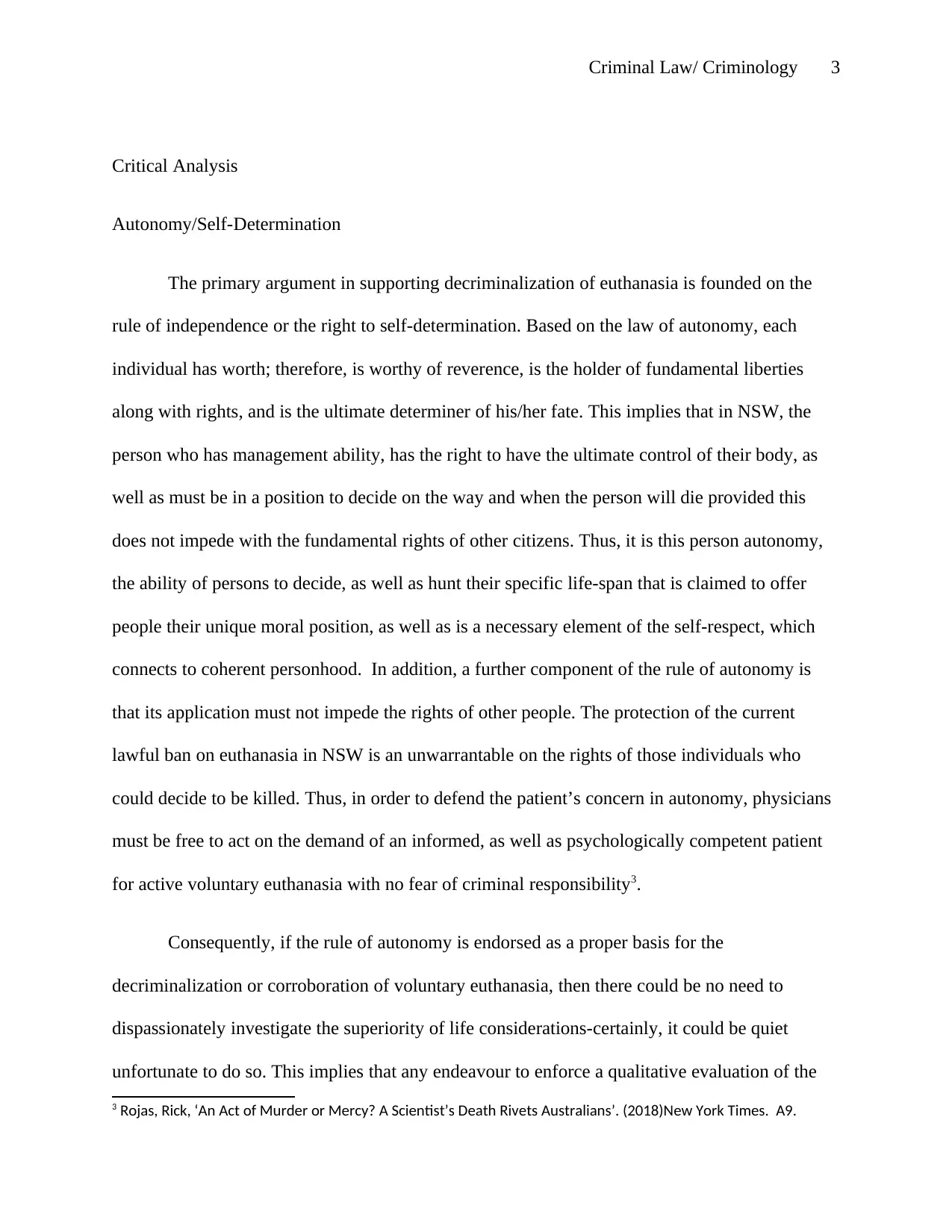
Criminal Law/ Criminology 3
Critical Analysis
Autonomy/Self-Determination
The primary argument in supporting decriminalization of euthanasia is founded on the
rule of independence or the right to self-determination. Based on the law of autonomy, each
individual has worth; therefore, is worthy of reverence, is the holder of fundamental liberties
along with rights, and is the ultimate determiner of his/her fate. This implies that in NSW, the
person who has management ability, has the right to have the ultimate control of their body, as
well as must be in a position to decide on the way and when the person will die provided this
does not impede with the fundamental rights of other citizens. Thus, it is this person autonomy,
the ability of persons to decide, as well as hunt their specific life-span that is claimed to offer
people their unique moral position, as well as is a necessary element of the self-respect, which
connects to coherent personhood. In addition, a further component of the rule of autonomy is
that its application must not impede the rights of other people. The protection of the current
lawful ban on euthanasia in NSW is an unwarrantable on the rights of those individuals who
could decide to be killed. Thus, in order to defend the patient’s concern in autonomy, physicians
must be free to act on the demand of an informed, as well as psychologically competent patient
for active voluntary euthanasia with no fear of criminal responsibility3.
Consequently, if the rule of autonomy is endorsed as a proper basis for the
decriminalization or corroboration of voluntary euthanasia, then there could be no need to
dispassionately investigate the superiority of life considerations-certainly, it could be quiet
unfortunate to do so. This implies that any endeavour to enforce a qualitative evaluation of the
3 Rojas, Rick, ‘An Act of Murder or Mercy? A Scientist’s Death Rivets Australians’. (2018)New York Times. A9.
Critical Analysis
Autonomy/Self-Determination
The primary argument in supporting decriminalization of euthanasia is founded on the
rule of independence or the right to self-determination. Based on the law of autonomy, each
individual has worth; therefore, is worthy of reverence, is the holder of fundamental liberties
along with rights, and is the ultimate determiner of his/her fate. This implies that in NSW, the
person who has management ability, has the right to have the ultimate control of their body, as
well as must be in a position to decide on the way and when the person will die provided this
does not impede with the fundamental rights of other citizens. Thus, it is this person autonomy,
the ability of persons to decide, as well as hunt their specific life-span that is claimed to offer
people their unique moral position, as well as is a necessary element of the self-respect, which
connects to coherent personhood. In addition, a further component of the rule of autonomy is
that its application must not impede the rights of other people. The protection of the current
lawful ban on euthanasia in NSW is an unwarrantable on the rights of those individuals who
could decide to be killed. Thus, in order to defend the patient’s concern in autonomy, physicians
must be free to act on the demand of an informed, as well as psychologically competent patient
for active voluntary euthanasia with no fear of criminal responsibility3.
Consequently, if the rule of autonomy is endorsed as a proper basis for the
decriminalization or corroboration of voluntary euthanasia, then there could be no need to
dispassionately investigate the superiority of life considerations-certainly, it could be quiet
unfortunate to do so. This implies that any endeavour to enforce a qualitative evaluation of the
3 Rojas, Rick, ‘An Act of Murder or Mercy? A Scientist’s Death Rivets Australians’. (2018)New York Times. A9.
⊘ This is a preview!⊘
Do you want full access?
Subscribe today to unlock all pages.

Trusted by 1+ million students worldwide
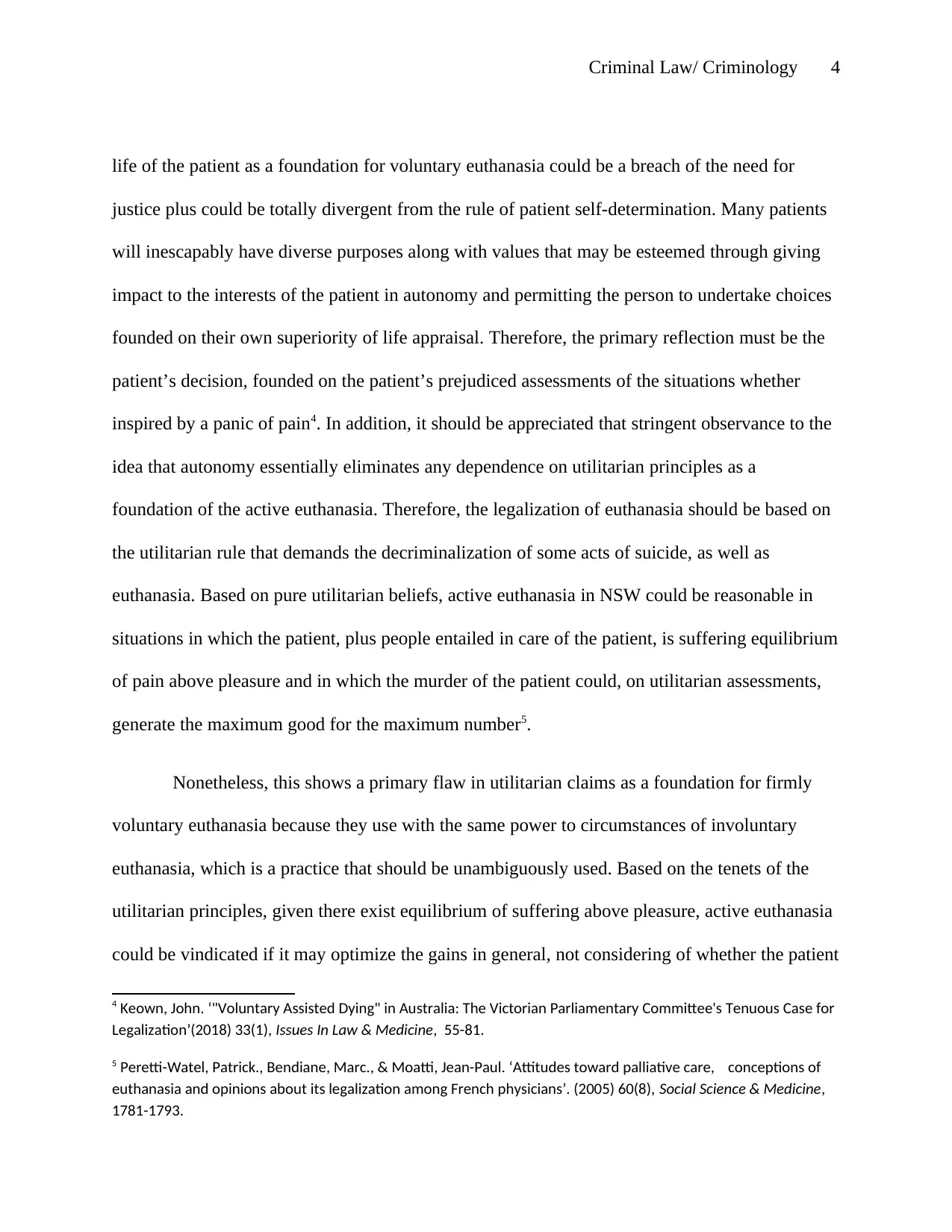
Criminal Law/ Criminology 4
life of the patient as a foundation for voluntary euthanasia could be a breach of the need for
justice plus could be totally divergent from the rule of patient self-determination. Many patients
will inescapably have diverse purposes along with values that may be esteemed through giving
impact to the interests of the patient in autonomy and permitting the person to undertake choices
founded on their own superiority of life appraisal. Therefore, the primary reflection must be the
patient’s decision, founded on the patient’s prejudiced assessments of the situations whether
inspired by a panic of pain4. In addition, it should be appreciated that stringent observance to the
idea that autonomy essentially eliminates any dependence on utilitarian principles as a
foundation of the active euthanasia. Therefore, the legalization of euthanasia should be based on
the utilitarian rule that demands the decriminalization of some acts of suicide, as well as
euthanasia. Based on pure utilitarian beliefs, active euthanasia in NSW could be reasonable in
situations in which the patient, plus people entailed in care of the patient, is suffering equilibrium
of pain above pleasure and in which the murder of the patient could, on utilitarian assessments,
generate the maximum good for the maximum number5.
Nonetheless, this shows a primary flaw in utilitarian claims as a foundation for firmly
voluntary euthanasia because they use with the same power to circumstances of involuntary
euthanasia, which is a practice that should be unambiguously used. Based on the tenets of the
utilitarian principles, given there exist equilibrium of suffering above pleasure, active euthanasia
could be vindicated if it may optimize the gains in general, not considering of whether the patient
4 Keown, John. ‘"Voluntary Assisted Dying" in Australia: The Victorian Parliamentary Committee's Tenuous Case for
Legalization’(2018) 33(1), Issues In Law & Medicine, 55-81.
5 Peretti-Watel, Patrick., Bendiane, Marc., & Moatti, Jean-Paul. ‘Attitudes toward palliative care, conceptions of
euthanasia and opinions about its legalization among French physicians’. (2005) 60(8), Social Science & Medicine,
1781-1793.
life of the patient as a foundation for voluntary euthanasia could be a breach of the need for
justice plus could be totally divergent from the rule of patient self-determination. Many patients
will inescapably have diverse purposes along with values that may be esteemed through giving
impact to the interests of the patient in autonomy and permitting the person to undertake choices
founded on their own superiority of life appraisal. Therefore, the primary reflection must be the
patient’s decision, founded on the patient’s prejudiced assessments of the situations whether
inspired by a panic of pain4. In addition, it should be appreciated that stringent observance to the
idea that autonomy essentially eliminates any dependence on utilitarian principles as a
foundation of the active euthanasia. Therefore, the legalization of euthanasia should be based on
the utilitarian rule that demands the decriminalization of some acts of suicide, as well as
euthanasia. Based on pure utilitarian beliefs, active euthanasia in NSW could be reasonable in
situations in which the patient, plus people entailed in care of the patient, is suffering equilibrium
of pain above pleasure and in which the murder of the patient could, on utilitarian assessments,
generate the maximum good for the maximum number5.
Nonetheless, this shows a primary flaw in utilitarian claims as a foundation for firmly
voluntary euthanasia because they use with the same power to circumstances of involuntary
euthanasia, which is a practice that should be unambiguously used. Based on the tenets of the
utilitarian principles, given there exist equilibrium of suffering above pleasure, active euthanasia
could be vindicated if it may optimize the gains in general, not considering of whether the patient
4 Keown, John. ‘"Voluntary Assisted Dying" in Australia: The Victorian Parliamentary Committee's Tenuous Case for
Legalization’(2018) 33(1), Issues In Law & Medicine, 55-81.
5 Peretti-Watel, Patrick., Bendiane, Marc., & Moatti, Jean-Paul. ‘Attitudes toward palliative care, conceptions of
euthanasia and opinions about its legalization among French physicians’. (2005) 60(8), Social Science & Medicine,
1781-1793.
Paraphrase This Document
Need a fresh take? Get an instant paraphrase of this document with our AI Paraphraser
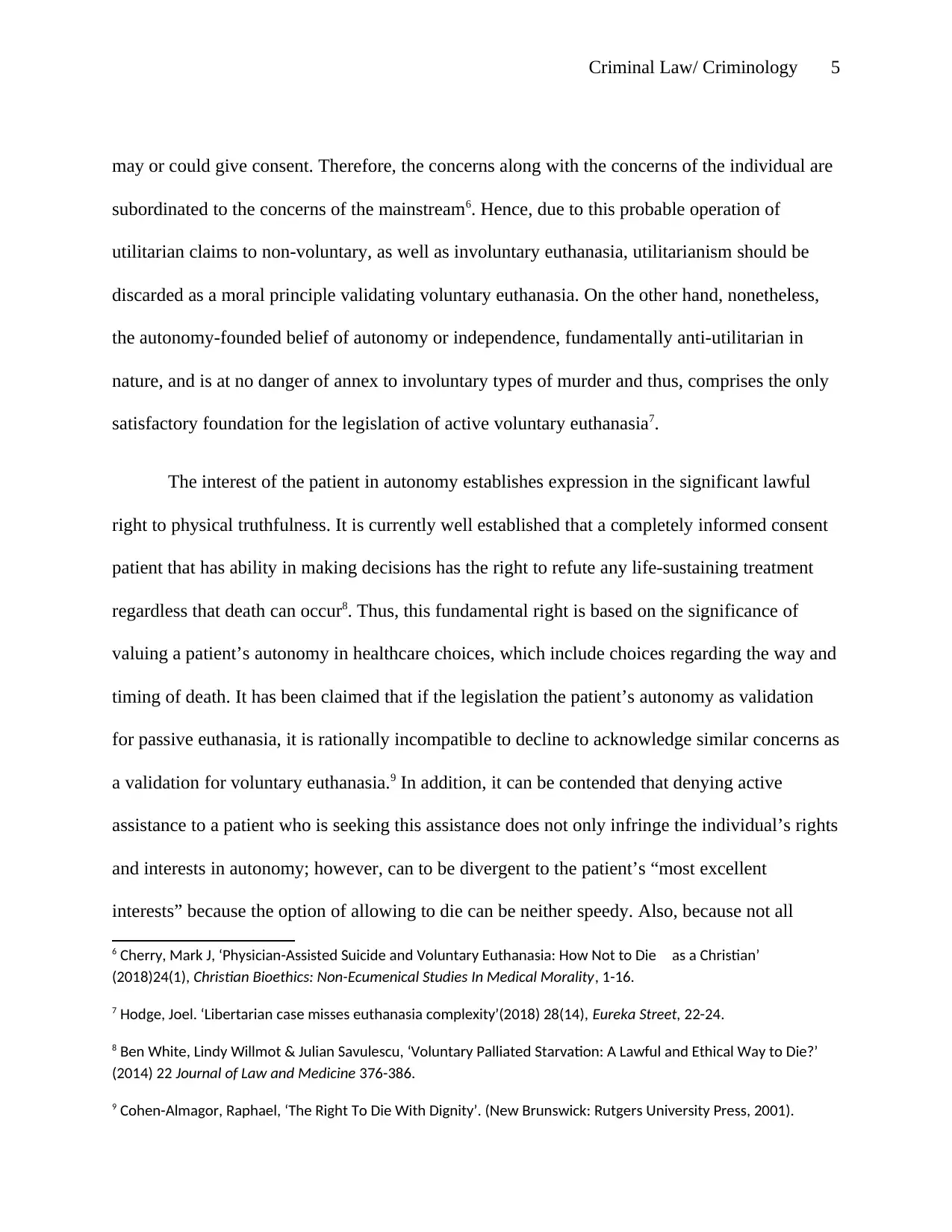
Criminal Law/ Criminology 5
may or could give consent. Therefore, the concerns along with the concerns of the individual are
subordinated to the concerns of the mainstream6. Hence, due to this probable operation of
utilitarian claims to non-voluntary, as well as involuntary euthanasia, utilitarianism should be
discarded as a moral principle validating voluntary euthanasia. On the other hand, nonetheless,
the autonomy-founded belief of autonomy or independence, fundamentally anti-utilitarian in
nature, and is at no danger of annex to involuntary types of murder and thus, comprises the only
satisfactory foundation for the legislation of active voluntary euthanasia7.
The interest of the patient in autonomy establishes expression in the significant lawful
right to physical truthfulness. It is currently well established that a completely informed consent
patient that has ability in making decisions has the right to refute any life-sustaining treatment
regardless that death can occur8. Thus, this fundamental right is based on the significance of
valuing a patient’s autonomy in healthcare choices, which include choices regarding the way and
timing of death. It has been claimed that if the legislation the patient’s autonomy as validation
for passive euthanasia, it is rationally incompatible to decline to acknowledge similar concerns as
a validation for voluntary euthanasia.9 In addition, it can be contended that denying active
assistance to a patient who is seeking this assistance does not only infringe the individual’s rights
and interests in autonomy; however, can to be divergent to the patient’s “most excellent
interests” because the option of allowing to die can be neither speedy. Also, because not all
6 Cherry, Mark J, ‘Physician-Assisted Suicide and Voluntary Euthanasia: How Not to Die as a Christian’
(2018)24(1), Christian Bioethics: Non-Ecumenical Studies In Medical Morality, 1-16.
7 Hodge, Joel. ‘Libertarian case misses euthanasia complexity’(2018) 28(14), Eureka Street, 22-24.
8 Ben White, Lindy Willmot & Julian Savulescu, ‘Voluntary Palliated Starvation: A Lawful and Ethical Way to Die?’
(2014) 22 Journal of Law and Medicine 376-386.
9 Cohen-Almagor, Raphael, ‘The Right To Die With Dignity’. (New Brunswick: Rutgers University Press, 2001).
may or could give consent. Therefore, the concerns along with the concerns of the individual are
subordinated to the concerns of the mainstream6. Hence, due to this probable operation of
utilitarian claims to non-voluntary, as well as involuntary euthanasia, utilitarianism should be
discarded as a moral principle validating voluntary euthanasia. On the other hand, nonetheless,
the autonomy-founded belief of autonomy or independence, fundamentally anti-utilitarian in
nature, and is at no danger of annex to involuntary types of murder and thus, comprises the only
satisfactory foundation for the legislation of active voluntary euthanasia7.
The interest of the patient in autonomy establishes expression in the significant lawful
right to physical truthfulness. It is currently well established that a completely informed consent
patient that has ability in making decisions has the right to refute any life-sustaining treatment
regardless that death can occur8. Thus, this fundamental right is based on the significance of
valuing a patient’s autonomy in healthcare choices, which include choices regarding the way and
timing of death. It has been claimed that if the legislation the patient’s autonomy as validation
for passive euthanasia, it is rationally incompatible to decline to acknowledge similar concerns as
a validation for voluntary euthanasia.9 In addition, it can be contended that denying active
assistance to a patient who is seeking this assistance does not only infringe the individual’s rights
and interests in autonomy; however, can to be divergent to the patient’s “most excellent
interests” because the option of allowing to die can be neither speedy. Also, because not all
6 Cherry, Mark J, ‘Physician-Assisted Suicide and Voluntary Euthanasia: How Not to Die as a Christian’
(2018)24(1), Christian Bioethics: Non-Ecumenical Studies In Medical Morality, 1-16.
7 Hodge, Joel. ‘Libertarian case misses euthanasia complexity’(2018) 28(14), Eureka Street, 22-24.
8 Ben White, Lindy Willmot & Julian Savulescu, ‘Voluntary Palliated Starvation: A Lawful and Ethical Way to Die?’
(2014) 22 Journal of Law and Medicine 376-386.
9 Cohen-Almagor, Raphael, ‘The Right To Die With Dignity’. (New Brunswick: Rutgers University Press, 2001).
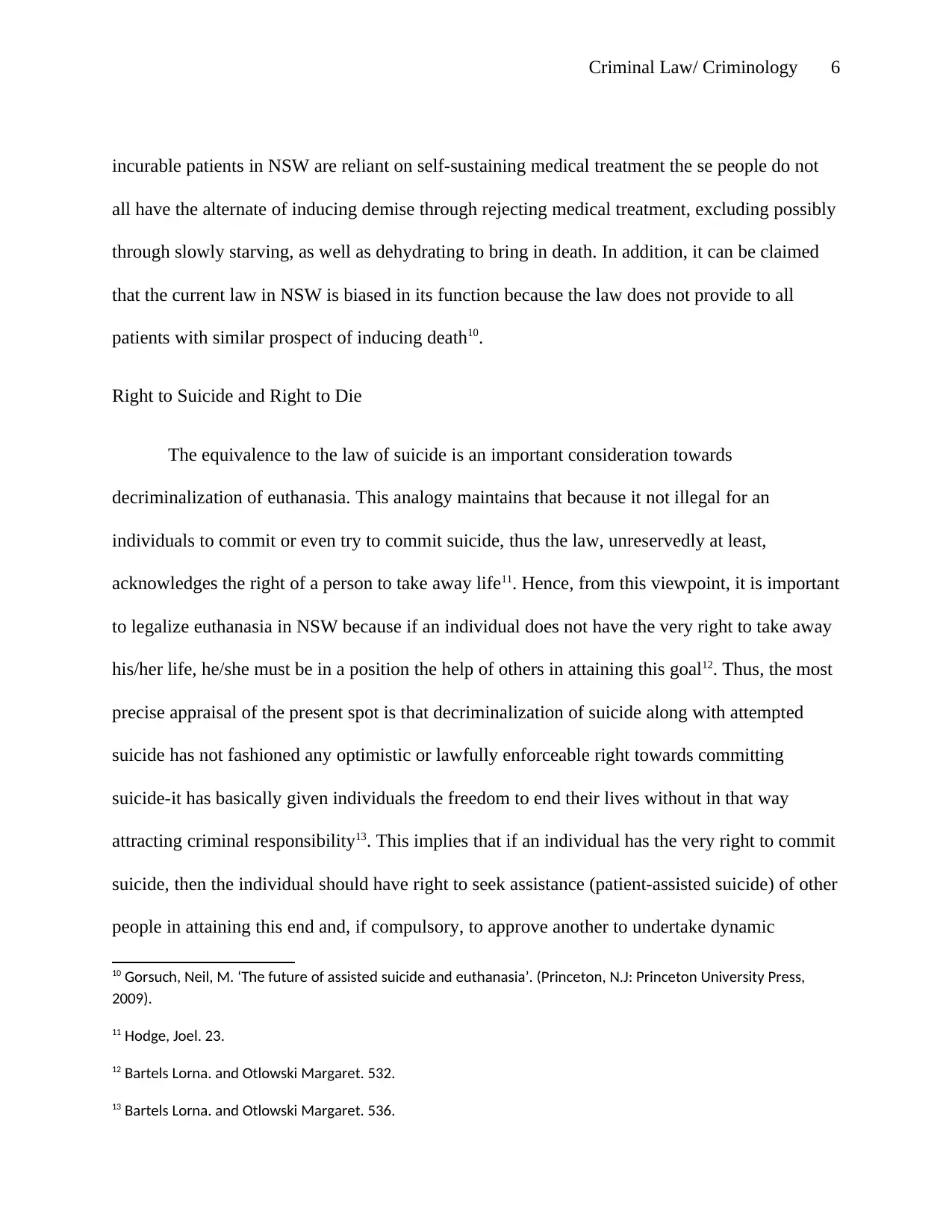
Criminal Law/ Criminology 6
incurable patients in NSW are reliant on self-sustaining medical treatment the se people do not
all have the alternate of inducing demise through rejecting medical treatment, excluding possibly
through slowly starving, as well as dehydrating to bring in death. In addition, it can be claimed
that the current law in NSW is biased in its function because the law does not provide to all
patients with similar prospect of inducing death10.
Right to Suicide and Right to Die
The equivalence to the law of suicide is an important consideration towards
decriminalization of euthanasia. This analogy maintains that because it not illegal for an
individuals to commit or even try to commit suicide, thus the law, unreservedly at least,
acknowledges the right of a person to take away life11. Hence, from this viewpoint, it is important
to legalize euthanasia in NSW because if an individual does not have the very right to take away
his/her life, he/she must be in a position the help of others in attaining this goal12. Thus, the most
precise appraisal of the present spot is that decriminalization of suicide along with attempted
suicide has not fashioned any optimistic or lawfully enforceable right towards committing
suicide-it has basically given individuals the freedom to end their lives without in that way
attracting criminal responsibility13. This implies that if an individual has the very right to commit
suicide, then the individual should have right to seek assistance (patient-assisted suicide) of other
people in attaining this end and, if compulsory, to approve another to undertake dynamic
10 Gorsuch, Neil, M. ‘The future of assisted suicide and euthanasia’. (Princeton, N.J: Princeton University Press,
2009).
11 Hodge, Joel. 23.
12 Bartels Lorna. and Otlowski Margaret. 532.
13 Bartels Lorna. and Otlowski Margaret. 536.
incurable patients in NSW are reliant on self-sustaining medical treatment the se people do not
all have the alternate of inducing demise through rejecting medical treatment, excluding possibly
through slowly starving, as well as dehydrating to bring in death. In addition, it can be claimed
that the current law in NSW is biased in its function because the law does not provide to all
patients with similar prospect of inducing death10.
Right to Suicide and Right to Die
The equivalence to the law of suicide is an important consideration towards
decriminalization of euthanasia. This analogy maintains that because it not illegal for an
individuals to commit or even try to commit suicide, thus the law, unreservedly at least,
acknowledges the right of a person to take away life11. Hence, from this viewpoint, it is important
to legalize euthanasia in NSW because if an individual does not have the very right to take away
his/her life, he/she must be in a position the help of others in attaining this goal12. Thus, the most
precise appraisal of the present spot is that decriminalization of suicide along with attempted
suicide has not fashioned any optimistic or lawfully enforceable right towards committing
suicide-it has basically given individuals the freedom to end their lives without in that way
attracting criminal responsibility13. This implies that if an individual has the very right to commit
suicide, then the individual should have right to seek assistance (patient-assisted suicide) of other
people in attaining this end and, if compulsory, to approve another to undertake dynamic
10 Gorsuch, Neil, M. ‘The future of assisted suicide and euthanasia’. (Princeton, N.J: Princeton University Press,
2009).
11 Hodge, Joel. 23.
12 Bartels Lorna. and Otlowski Margaret. 532.
13 Bartels Lorna. and Otlowski Margaret. 536.
⊘ This is a preview!⊘
Do you want full access?
Subscribe today to unlock all pages.

Trusted by 1+ million students worldwide
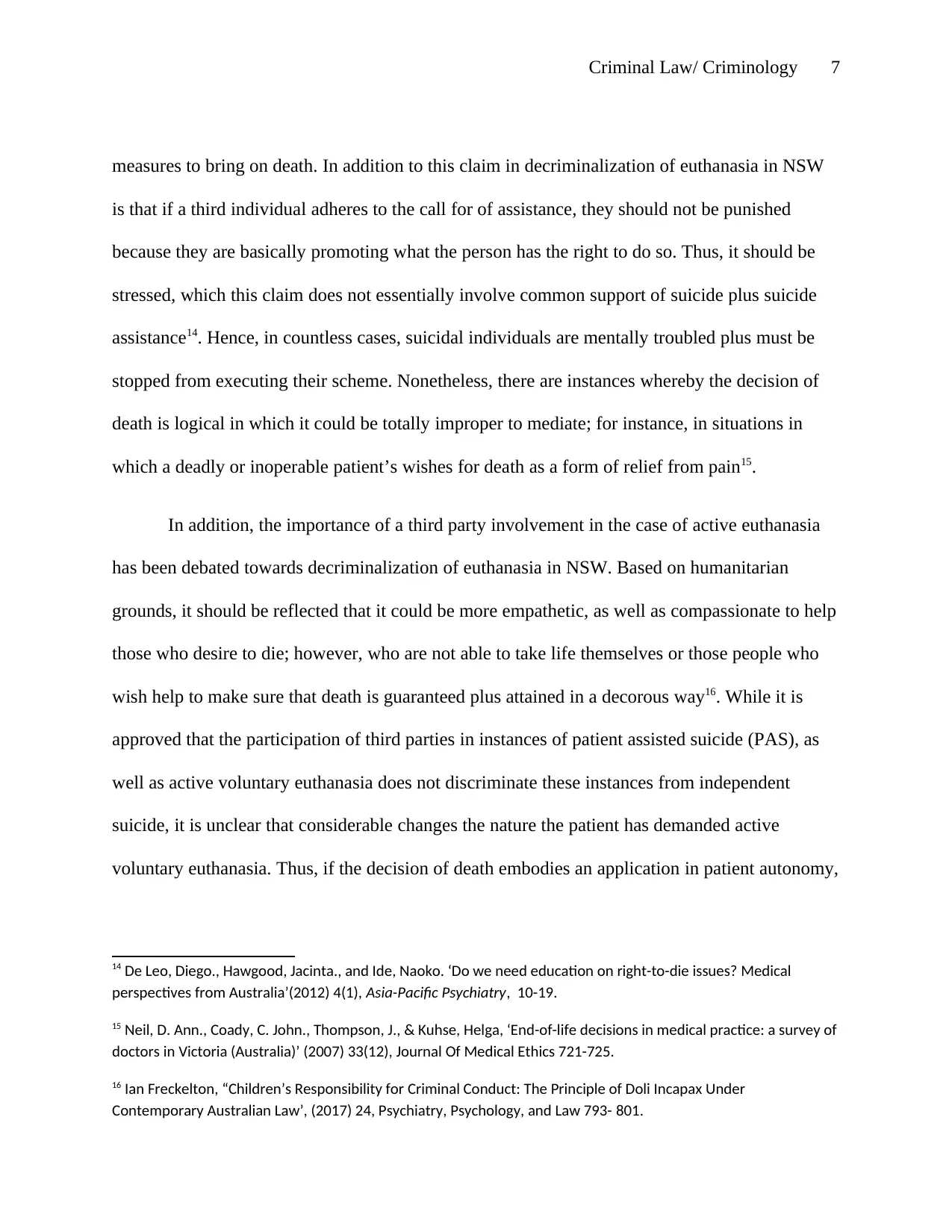
Criminal Law/ Criminology 7
measures to bring on death. In addition to this claim in decriminalization of euthanasia in NSW
is that if a third individual adheres to the call for of assistance, they should not be punished
because they are basically promoting what the person has the right to do so. Thus, it should be
stressed, which this claim does not essentially involve common support of suicide plus suicide
assistance14. Hence, in countless cases, suicidal individuals are mentally troubled plus must be
stopped from executing their scheme. Nonetheless, there are instances whereby the decision of
death is logical in which it could be totally improper to mediate; for instance, in situations in
which a deadly or inoperable patient’s wishes for death as a form of relief from pain15.
In addition, the importance of a third party involvement in the case of active euthanasia
has been debated towards decriminalization of euthanasia in NSW. Based on humanitarian
grounds, it should be reflected that it could be more empathetic, as well as compassionate to help
those who desire to die; however, who are not able to take life themselves or those people who
wish help to make sure that death is guaranteed plus attained in a decorous way16. While it is
approved that the participation of third parties in instances of patient assisted suicide (PAS), as
well as active voluntary euthanasia does not discriminate these instances from independent
suicide, it is unclear that considerable changes the nature the patient has demanded active
voluntary euthanasia. Thus, if the decision of death embodies an application in patient autonomy,
14 De Leo, Diego., Hawgood, Jacinta., and Ide, Naoko. ‘Do we need education on right-to-die issues? Medical
perspectives from Australia’(2012) 4(1), Asia-Pacific Psychiatry, 10-19.
15 Neil, D. Ann., Coady, C. John., Thompson, J., & Kuhse, Helga, ‘End-of-life decisions in medical practice: a survey of
doctors in Victoria (Australia)’ (2007) 33(12), Journal Of Medical Ethics 721-725.
16 Ian Freckelton, “Children’s Responsibility for Criminal Conduct: The Principle of Doli Incapax Under
Contemporary Australian Law’, (2017) 24, Psychiatry, Psychology, and Law 793- 801.
measures to bring on death. In addition to this claim in decriminalization of euthanasia in NSW
is that if a third individual adheres to the call for of assistance, they should not be punished
because they are basically promoting what the person has the right to do so. Thus, it should be
stressed, which this claim does not essentially involve common support of suicide plus suicide
assistance14. Hence, in countless cases, suicidal individuals are mentally troubled plus must be
stopped from executing their scheme. Nonetheless, there are instances whereby the decision of
death is logical in which it could be totally improper to mediate; for instance, in situations in
which a deadly or inoperable patient’s wishes for death as a form of relief from pain15.
In addition, the importance of a third party involvement in the case of active euthanasia
has been debated towards decriminalization of euthanasia in NSW. Based on humanitarian
grounds, it should be reflected that it could be more empathetic, as well as compassionate to help
those who desire to die; however, who are not able to take life themselves or those people who
wish help to make sure that death is guaranteed plus attained in a decorous way16. While it is
approved that the participation of third parties in instances of patient assisted suicide (PAS), as
well as active voluntary euthanasia does not discriminate these instances from independent
suicide, it is unclear that considerable changes the nature the patient has demanded active
voluntary euthanasia. Thus, if the decision of death embodies an application in patient autonomy,
14 De Leo, Diego., Hawgood, Jacinta., and Ide, Naoko. ‘Do we need education on right-to-die issues? Medical
perspectives from Australia’(2012) 4(1), Asia-Pacific Psychiatry, 10-19.
15 Neil, D. Ann., Coady, C. John., Thompson, J., & Kuhse, Helga, ‘End-of-life decisions in medical practice: a survey of
doctors in Victoria (Australia)’ (2007) 33(12), Journal Of Medical Ethics 721-725.
16 Ian Freckelton, “Children’s Responsibility for Criminal Conduct: The Principle of Doli Incapax Under
Contemporary Australian Law’, (2017) 24, Psychiatry, Psychology, and Law 793- 801.
Paraphrase This Document
Need a fresh take? Get an instant paraphrase of this document with our AI Paraphraser
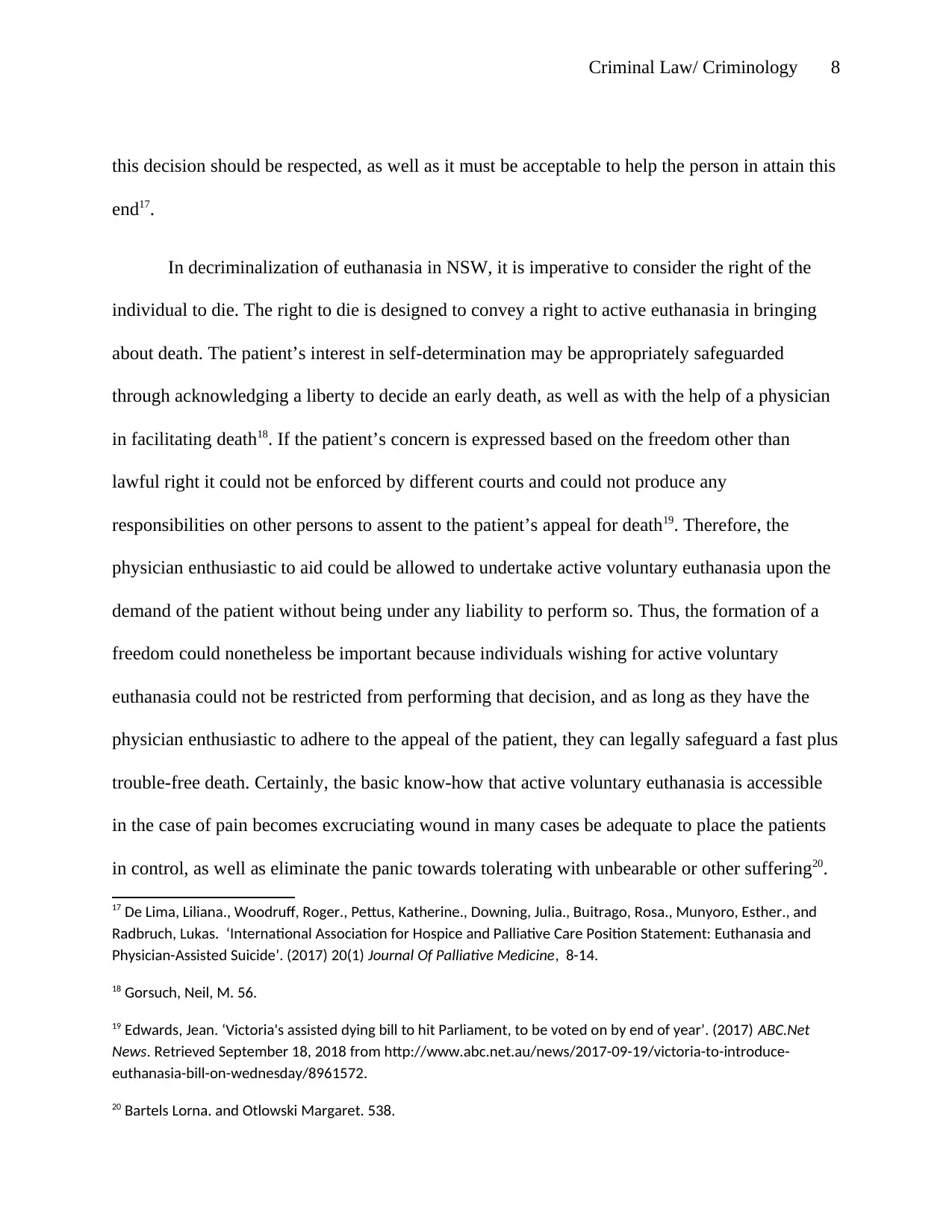
Criminal Law/ Criminology 8
this decision should be respected, as well as it must be acceptable to help the person in attain this
end17.
In decriminalization of euthanasia in NSW, it is imperative to consider the right of the
individual to die. The right to die is designed to convey a right to active euthanasia in bringing
about death. The patient’s interest in self-determination may be appropriately safeguarded
through acknowledging a liberty to decide an early death, as well as with the help of a physician
in facilitating death18. If the patient’s concern is expressed based on the freedom other than
lawful right it could not be enforced by different courts and could not produce any
responsibilities on other persons to assent to the patient’s appeal for death19. Therefore, the
physician enthusiastic to aid could be allowed to undertake active voluntary euthanasia upon the
demand of the patient without being under any liability to perform so. Thus, the formation of a
freedom could nonetheless be important because individuals wishing for active voluntary
euthanasia could not be restricted from performing that decision, and as long as they have the
physician enthusiastic to adhere to the appeal of the patient, they can legally safeguard a fast plus
trouble-free death. Certainly, the basic know-how that active voluntary euthanasia is accessible
in the case of pain becomes excruciating wound in many cases be adequate to place the patients
in control, as well as eliminate the panic towards tolerating with unbearable or other suffering20.
17 De Lima, Liliana., Woodruff, Roger., Pettus, Katherine., Downing, Julia., Buitrago, Rosa., Munyoro, Esther., and
Radbruch, Lukas. ‘International Association for Hospice and Palliative Care Position Statement: Euthanasia and
Physician-Assisted Suicide’. (2017) 20(1) Journal Of Palliative Medicine, 8-14.
18 Gorsuch, Neil, M. 56.
19 Edwards, Jean. ‘Victoria's assisted dying bill to hit Parliament, to be voted on by end of year’. (2017) ABC.Net
News. Retrieved September 18, 2018 from http://www.abc.net.au/news/2017-09-19/victoria-to-introduce-
euthanasia-bill-on-wednesday/8961572.
20 Bartels Lorna. and Otlowski Margaret. 538.
this decision should be respected, as well as it must be acceptable to help the person in attain this
end17.
In decriminalization of euthanasia in NSW, it is imperative to consider the right of the
individual to die. The right to die is designed to convey a right to active euthanasia in bringing
about death. The patient’s interest in self-determination may be appropriately safeguarded
through acknowledging a liberty to decide an early death, as well as with the help of a physician
in facilitating death18. If the patient’s concern is expressed based on the freedom other than
lawful right it could not be enforced by different courts and could not produce any
responsibilities on other persons to assent to the patient’s appeal for death19. Therefore, the
physician enthusiastic to aid could be allowed to undertake active voluntary euthanasia upon the
demand of the patient without being under any liability to perform so. Thus, the formation of a
freedom could nonetheless be important because individuals wishing for active voluntary
euthanasia could not be restricted from performing that decision, and as long as they have the
physician enthusiastic to adhere to the appeal of the patient, they can legally safeguard a fast plus
trouble-free death. Certainly, the basic know-how that active voluntary euthanasia is accessible
in the case of pain becomes excruciating wound in many cases be adequate to place the patients
in control, as well as eliminate the panic towards tolerating with unbearable or other suffering20.
17 De Lima, Liliana., Woodruff, Roger., Pettus, Katherine., Downing, Julia., Buitrago, Rosa., Munyoro, Esther., and
Radbruch, Lukas. ‘International Association for Hospice and Palliative Care Position Statement: Euthanasia and
Physician-Assisted Suicide’. (2017) 20(1) Journal Of Palliative Medicine, 8-14.
18 Gorsuch, Neil, M. 56.
19 Edwards, Jean. ‘Victoria's assisted dying bill to hit Parliament, to be voted on by end of year’. (2017) ABC.Net
News. Retrieved September 18, 2018 from http://www.abc.net.au/news/2017-09-19/victoria-to-introduce-
euthanasia-bill-on-wednesday/8961572.
20 Bartels Lorna. and Otlowski Margaret. 538.
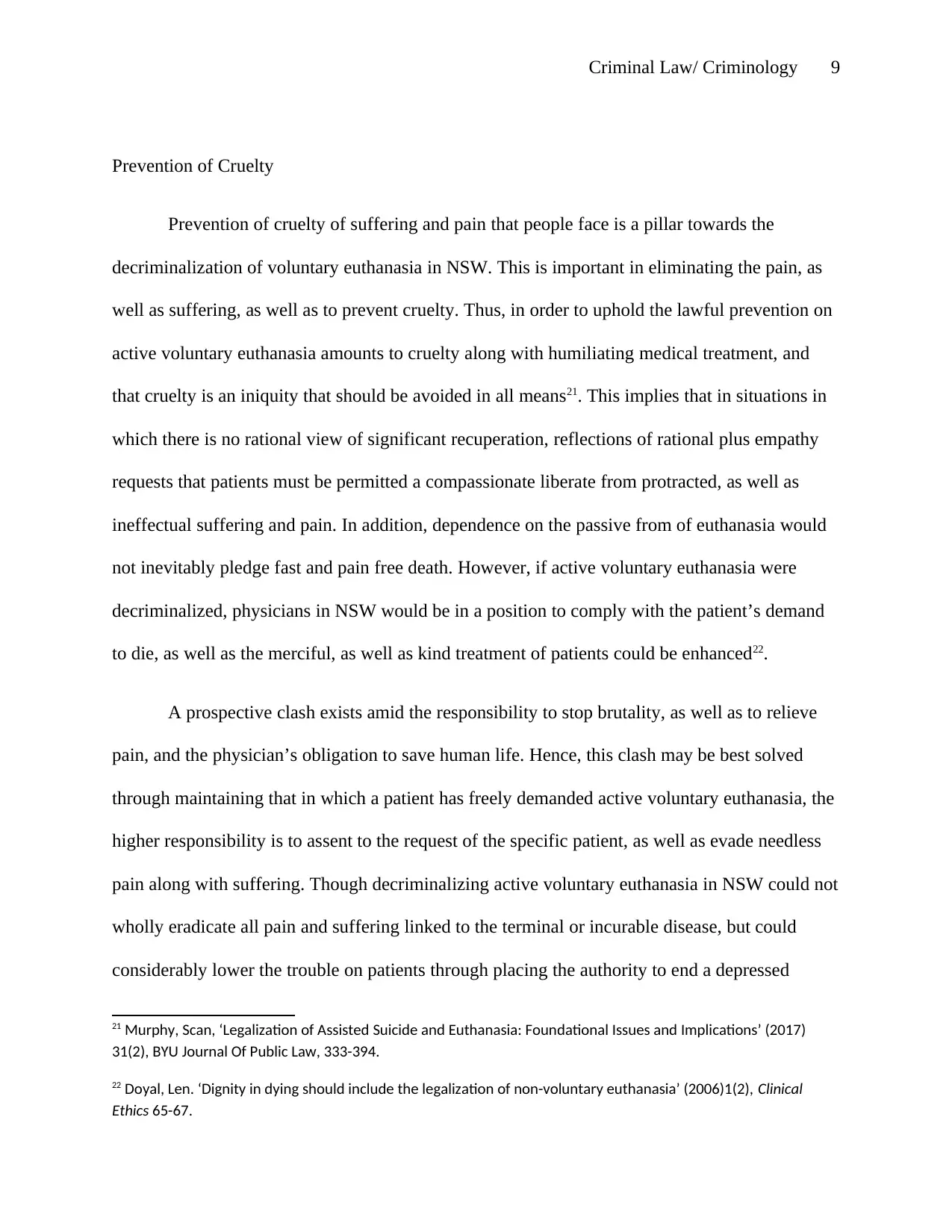
Criminal Law/ Criminology 9
Prevention of Cruelty
Prevention of cruelty of suffering and pain that people face is a pillar towards the
decriminalization of voluntary euthanasia in NSW. This is important in eliminating the pain, as
well as suffering, as well as to prevent cruelty. Thus, in order to uphold the lawful prevention on
active voluntary euthanasia amounts to cruelty along with humiliating medical treatment, and
that cruelty is an iniquity that should be avoided in all means21. This implies that in situations in
which there is no rational view of significant recuperation, reflections of rational plus empathy
requests that patients must be permitted a compassionate liberate from protracted, as well as
ineffectual suffering and pain. In addition, dependence on the passive from of euthanasia would
not inevitably pledge fast and pain free death. However, if active voluntary euthanasia were
decriminalized, physicians in NSW would be in a position to comply with the patient’s demand
to die, as well as the merciful, as well as kind treatment of patients could be enhanced22.
A prospective clash exists amid the responsibility to stop brutality, as well as to relieve
pain, and the physician’s obligation to save human life. Hence, this clash may be best solved
through maintaining that in which a patient has freely demanded active voluntary euthanasia, the
higher responsibility is to assent to the request of the specific patient, as well as evade needless
pain along with suffering. Though decriminalizing active voluntary euthanasia in NSW could not
wholly eradicate all pain and suffering linked to the terminal or incurable disease, but could
considerably lower the trouble on patients through placing the authority to end a depressed
21 Murphy, Scan, ‘Legalization of Assisted Suicide and Euthanasia: Foundational Issues and Implications’ (2017)
31(2), BYU Journal Of Public Law, 333-394.
22 Doyal, Len. ‘Dignity in dying should include the legalization of non-voluntary euthanasia’ (2006)1(2), Clinical
Ethics 65-67.
Prevention of Cruelty
Prevention of cruelty of suffering and pain that people face is a pillar towards the
decriminalization of voluntary euthanasia in NSW. This is important in eliminating the pain, as
well as suffering, as well as to prevent cruelty. Thus, in order to uphold the lawful prevention on
active voluntary euthanasia amounts to cruelty along with humiliating medical treatment, and
that cruelty is an iniquity that should be avoided in all means21. This implies that in situations in
which there is no rational view of significant recuperation, reflections of rational plus empathy
requests that patients must be permitted a compassionate liberate from protracted, as well as
ineffectual suffering and pain. In addition, dependence on the passive from of euthanasia would
not inevitably pledge fast and pain free death. However, if active voluntary euthanasia were
decriminalized, physicians in NSW would be in a position to comply with the patient’s demand
to die, as well as the merciful, as well as kind treatment of patients could be enhanced22.
A prospective clash exists amid the responsibility to stop brutality, as well as to relieve
pain, and the physician’s obligation to save human life. Hence, this clash may be best solved
through maintaining that in which a patient has freely demanded active voluntary euthanasia, the
higher responsibility is to assent to the request of the specific patient, as well as evade needless
pain along with suffering. Though decriminalizing active voluntary euthanasia in NSW could not
wholly eradicate all pain and suffering linked to the terminal or incurable disease, but could
considerably lower the trouble on patients through placing the authority to end a depressed
21 Murphy, Scan, ‘Legalization of Assisted Suicide and Euthanasia: Foundational Issues and Implications’ (2017)
31(2), BYU Journal Of Public Law, 333-394.
22 Doyal, Len. ‘Dignity in dying should include the legalization of non-voluntary euthanasia’ (2006)1(2), Clinical
Ethics 65-67.
⊘ This is a preview!⊘
Do you want full access?
Subscribe today to unlock all pages.

Trusted by 1+ million students worldwide
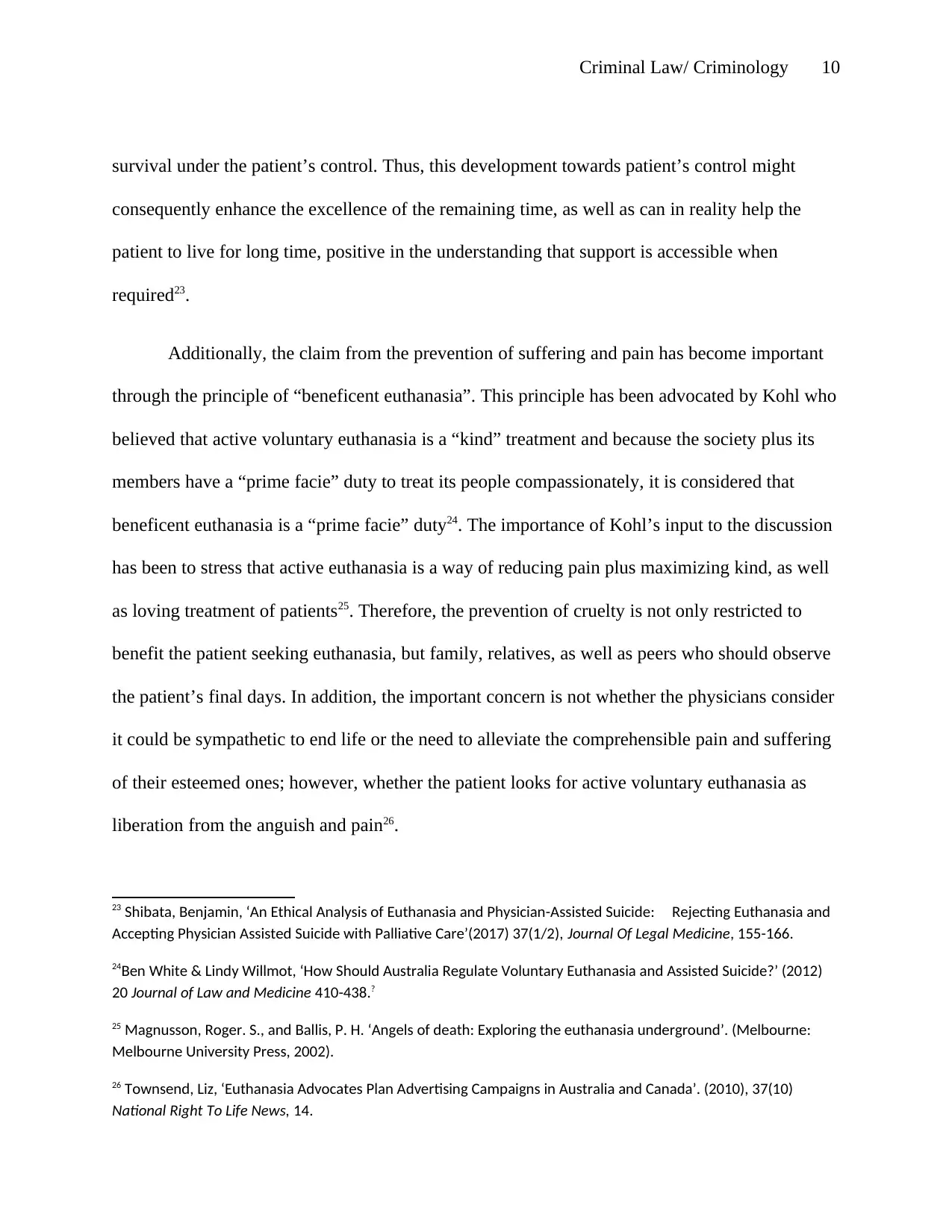
Criminal Law/ Criminology 10
survival under the patient’s control. Thus, this development towards patient’s control might
consequently enhance the excellence of the remaining time, as well as can in reality help the
patient to live for long time, positive in the understanding that support is accessible when
required23.
Additionally, the claim from the prevention of suffering and pain has become important
through the principle of “beneficent euthanasia”. This principle has been advocated by Kohl who
believed that active voluntary euthanasia is a “kind” treatment and because the society plus its
members have a “prime facie” duty to treat its people compassionately, it is considered that
beneficent euthanasia is a “prime facie” duty24. The importance of Kohl’s input to the discussion
has been to stress that active euthanasia is a way of reducing pain plus maximizing kind, as well
as loving treatment of patients25. Therefore, the prevention of cruelty is not only restricted to
benefit the patient seeking euthanasia, but family, relatives, as well as peers who should observe
the patient’s final days. In addition, the important concern is not whether the physicians consider
it could be sympathetic to end life or the need to alleviate the comprehensible pain and suffering
of their esteemed ones; however, whether the patient looks for active voluntary euthanasia as
liberation from the anguish and pain26.
23 Shibata, Benjamin, ‘An Ethical Analysis of Euthanasia and Physician-Assisted Suicide: Rejecting Euthanasia and
Accepting Physician Assisted Suicide with Palliative Care’(2017) 37(1/2), Journal Of Legal Medicine, 155-166.
24Ben White & Lindy Willmot, ‘How Should Australia Regulate Voluntary Euthanasia and Assisted Suicide?’ (2012)
20 Journal of Law and Medicine 410-438.?
25 Magnusson, Roger. S., and Ballis, P. H. ‘Angels of death: Exploring the euthanasia underground’. (Melbourne:
Melbourne University Press, 2002).
26 Townsend, Liz, ‘Euthanasia Advocates Plan Advertising Campaigns in Australia and Canada’. (2010), 37(10)
National Right To Life News, 14.
survival under the patient’s control. Thus, this development towards patient’s control might
consequently enhance the excellence of the remaining time, as well as can in reality help the
patient to live for long time, positive in the understanding that support is accessible when
required23.
Additionally, the claim from the prevention of suffering and pain has become important
through the principle of “beneficent euthanasia”. This principle has been advocated by Kohl who
believed that active voluntary euthanasia is a “kind” treatment and because the society plus its
members have a “prime facie” duty to treat its people compassionately, it is considered that
beneficent euthanasia is a “prime facie” duty24. The importance of Kohl’s input to the discussion
has been to stress that active euthanasia is a way of reducing pain plus maximizing kind, as well
as loving treatment of patients25. Therefore, the prevention of cruelty is not only restricted to
benefit the patient seeking euthanasia, but family, relatives, as well as peers who should observe
the patient’s final days. In addition, the important concern is not whether the physicians consider
it could be sympathetic to end life or the need to alleviate the comprehensible pain and suffering
of their esteemed ones; however, whether the patient looks for active voluntary euthanasia as
liberation from the anguish and pain26.
23 Shibata, Benjamin, ‘An Ethical Analysis of Euthanasia and Physician-Assisted Suicide: Rejecting Euthanasia and
Accepting Physician Assisted Suicide with Palliative Care’(2017) 37(1/2), Journal Of Legal Medicine, 155-166.
24Ben White & Lindy Willmot, ‘How Should Australia Regulate Voluntary Euthanasia and Assisted Suicide?’ (2012)
20 Journal of Law and Medicine 410-438.?
25 Magnusson, Roger. S., and Ballis, P. H. ‘Angels of death: Exploring the euthanasia underground’. (Melbourne:
Melbourne University Press, 2002).
26 Townsend, Liz, ‘Euthanasia Advocates Plan Advertising Campaigns in Australia and Canada’. (2010), 37(10)
National Right To Life News, 14.
Paraphrase This Document
Need a fresh take? Get an instant paraphrase of this document with our AI Paraphraser
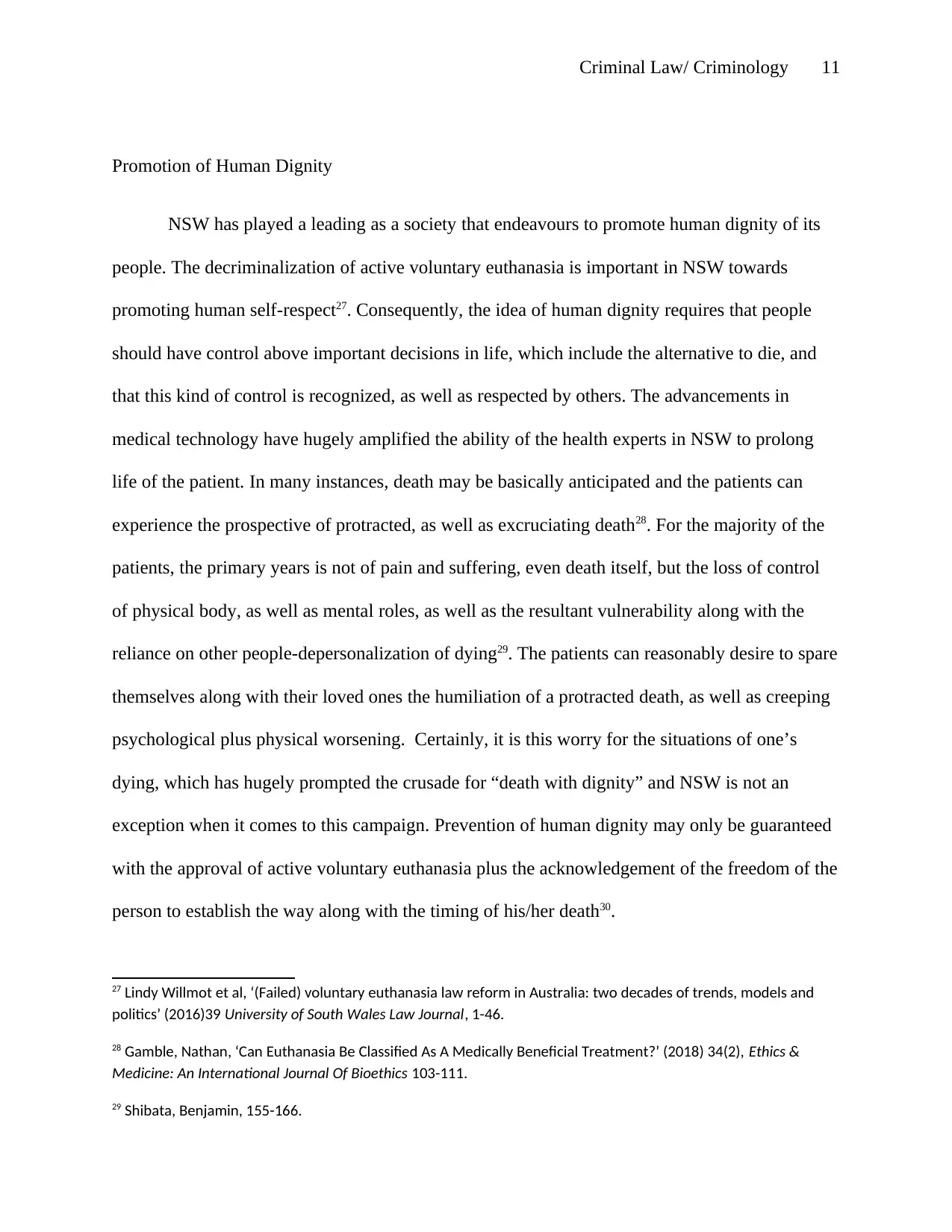
Criminal Law/ Criminology 11
Promotion of Human Dignity
NSW has played a leading as a society that endeavours to promote human dignity of its
people. The decriminalization of active voluntary euthanasia is important in NSW towards
promoting human self-respect27. Consequently, the idea of human dignity requires that people
should have control above important decisions in life, which include the alternative to die, and
that this kind of control is recognized, as well as respected by others. The advancements in
medical technology have hugely amplified the ability of the health experts in NSW to prolong
life of the patient. In many instances, death may be basically anticipated and the patients can
experience the prospective of protracted, as well as excruciating death28. For the majority of the
patients, the primary years is not of pain and suffering, even death itself, but the loss of control
of physical body, as well as mental roles, as well as the resultant vulnerability along with the
reliance on other people-depersonalization of dying29. The patients can reasonably desire to spare
themselves along with their loved ones the humiliation of a protracted death, as well as creeping
psychological plus physical worsening. Certainly, it is this worry for the situations of one’s
dying, which has hugely prompted the crusade for “death with dignity” and NSW is not an
exception when it comes to this campaign. Prevention of human dignity may only be guaranteed
with the approval of active voluntary euthanasia plus the acknowledgement of the freedom of the
person to establish the way along with the timing of his/her death30.
27 Lindy Willmot et al, ‘(Failed) voluntary euthanasia law reform in Australia: two decades of trends, models and
politics’ (2016)39 University of South Wales Law Journal, 1-46.
28 Gamble, Nathan, ‘Can Euthanasia Be Classified As A Medically Beneficial Treatment?’ (2018) 34(2), Ethics &
Medicine: An International Journal Of Bioethics 103-111.
29 Shibata, Benjamin, 155-166.
Promotion of Human Dignity
NSW has played a leading as a society that endeavours to promote human dignity of its
people. The decriminalization of active voluntary euthanasia is important in NSW towards
promoting human self-respect27. Consequently, the idea of human dignity requires that people
should have control above important decisions in life, which include the alternative to die, and
that this kind of control is recognized, as well as respected by others. The advancements in
medical technology have hugely amplified the ability of the health experts in NSW to prolong
life of the patient. In many instances, death may be basically anticipated and the patients can
experience the prospective of protracted, as well as excruciating death28. For the majority of the
patients, the primary years is not of pain and suffering, even death itself, but the loss of control
of physical body, as well as mental roles, as well as the resultant vulnerability along with the
reliance on other people-depersonalization of dying29. The patients can reasonably desire to spare
themselves along with their loved ones the humiliation of a protracted death, as well as creeping
psychological plus physical worsening. Certainly, it is this worry for the situations of one’s
dying, which has hugely prompted the crusade for “death with dignity” and NSW is not an
exception when it comes to this campaign. Prevention of human dignity may only be guaranteed
with the approval of active voluntary euthanasia plus the acknowledgement of the freedom of the
person to establish the way along with the timing of his/her death30.
27 Lindy Willmot et al, ‘(Failed) voluntary euthanasia law reform in Australia: two decades of trends, models and
politics’ (2016)39 University of South Wales Law Journal, 1-46.
28 Gamble, Nathan, ‘Can Euthanasia Be Classified As A Medically Beneficial Treatment?’ (2018) 34(2), Ethics &
Medicine: An International Journal Of Bioethics 103-111.
29 Shibata, Benjamin, 155-166.
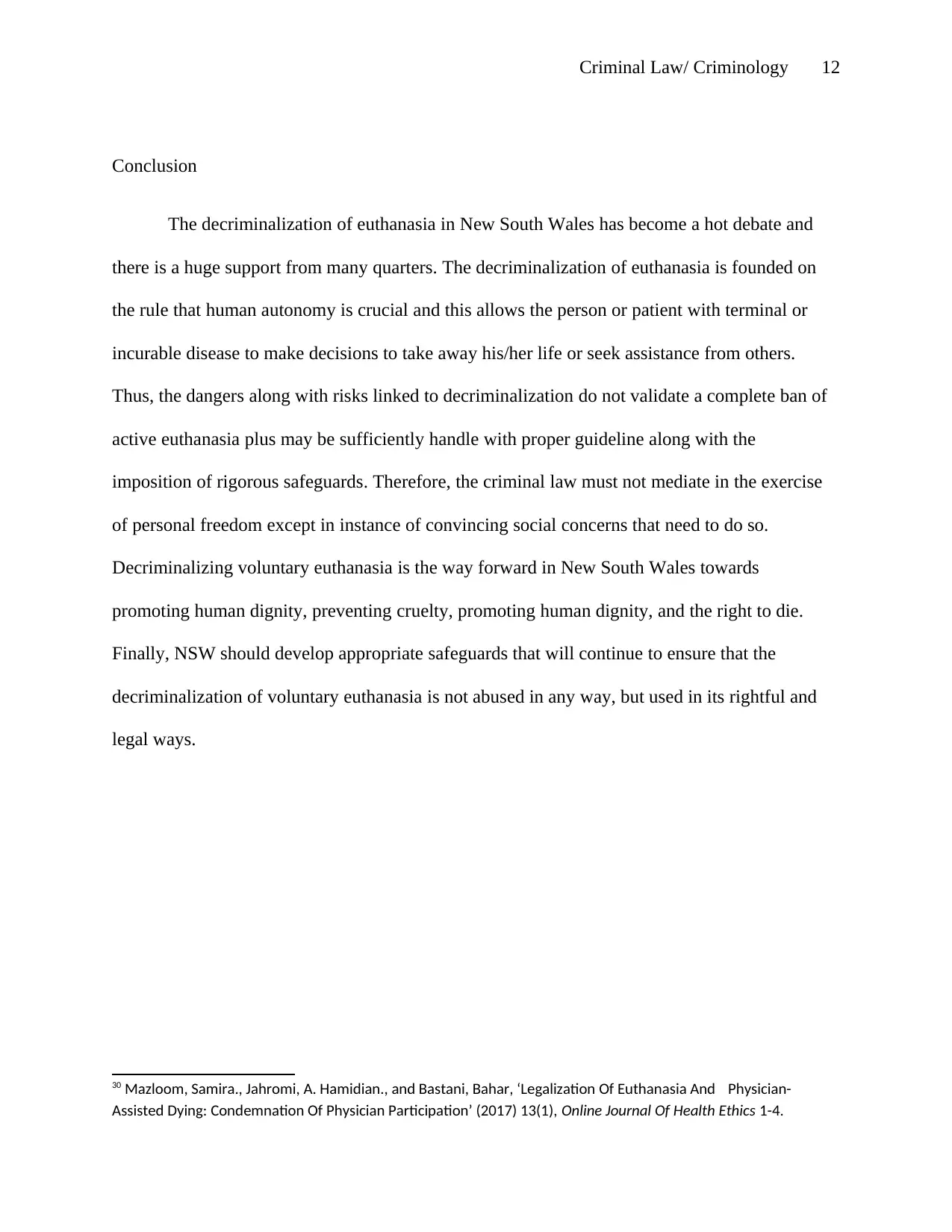
Criminal Law/ Criminology 12
Conclusion
The decriminalization of euthanasia in New South Wales has become a hot debate and
there is a huge support from many quarters. The decriminalization of euthanasia is founded on
the rule that human autonomy is crucial and this allows the person or patient with terminal or
incurable disease to make decisions to take away his/her life or seek assistance from others.
Thus, the dangers along with risks linked to decriminalization do not validate a complete ban of
active euthanasia plus may be sufficiently handle with proper guideline along with the
imposition of rigorous safeguards. Therefore, the criminal law must not mediate in the exercise
of personal freedom except in instance of convincing social concerns that need to do so.
Decriminalizing voluntary euthanasia is the way forward in New South Wales towards
promoting human dignity, preventing cruelty, promoting human dignity, and the right to die.
Finally, NSW should develop appropriate safeguards that will continue to ensure that the
decriminalization of voluntary euthanasia is not abused in any way, but used in its rightful and
legal ways.
30 Mazloom, Samira., Jahromi, A. Hamidian., and Bastani, Bahar, ‘Legalization Of Euthanasia And Physician-
Assisted Dying: Condemnation Of Physician Participation’ (2017) 13(1), Online Journal Of Health Ethics 1-4.
Conclusion
The decriminalization of euthanasia in New South Wales has become a hot debate and
there is a huge support from many quarters. The decriminalization of euthanasia is founded on
the rule that human autonomy is crucial and this allows the person or patient with terminal or
incurable disease to make decisions to take away his/her life or seek assistance from others.
Thus, the dangers along with risks linked to decriminalization do not validate a complete ban of
active euthanasia plus may be sufficiently handle with proper guideline along with the
imposition of rigorous safeguards. Therefore, the criminal law must not mediate in the exercise
of personal freedom except in instance of convincing social concerns that need to do so.
Decriminalizing voluntary euthanasia is the way forward in New South Wales towards
promoting human dignity, preventing cruelty, promoting human dignity, and the right to die.
Finally, NSW should develop appropriate safeguards that will continue to ensure that the
decriminalization of voluntary euthanasia is not abused in any way, but used in its rightful and
legal ways.
30 Mazloom, Samira., Jahromi, A. Hamidian., and Bastani, Bahar, ‘Legalization Of Euthanasia And Physician-
Assisted Dying: Condemnation Of Physician Participation’ (2017) 13(1), Online Journal Of Health Ethics 1-4.
⊘ This is a preview!⊘
Do you want full access?
Subscribe today to unlock all pages.

Trusted by 1+ million students worldwide
1 out of 17
Related Documents
Your All-in-One AI-Powered Toolkit for Academic Success.
+13062052269
info@desklib.com
Available 24*7 on WhatsApp / Email
![[object Object]](/_next/static/media/star-bottom.7253800d.svg)
Unlock your academic potential
Copyright © 2020–2026 A2Z Services. All Rights Reserved. Developed and managed by ZUCOL.





